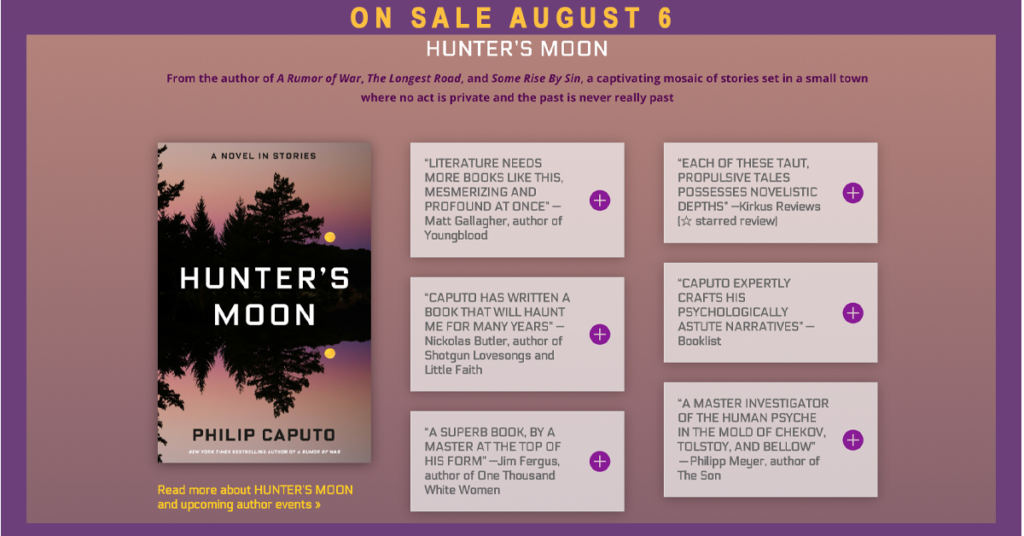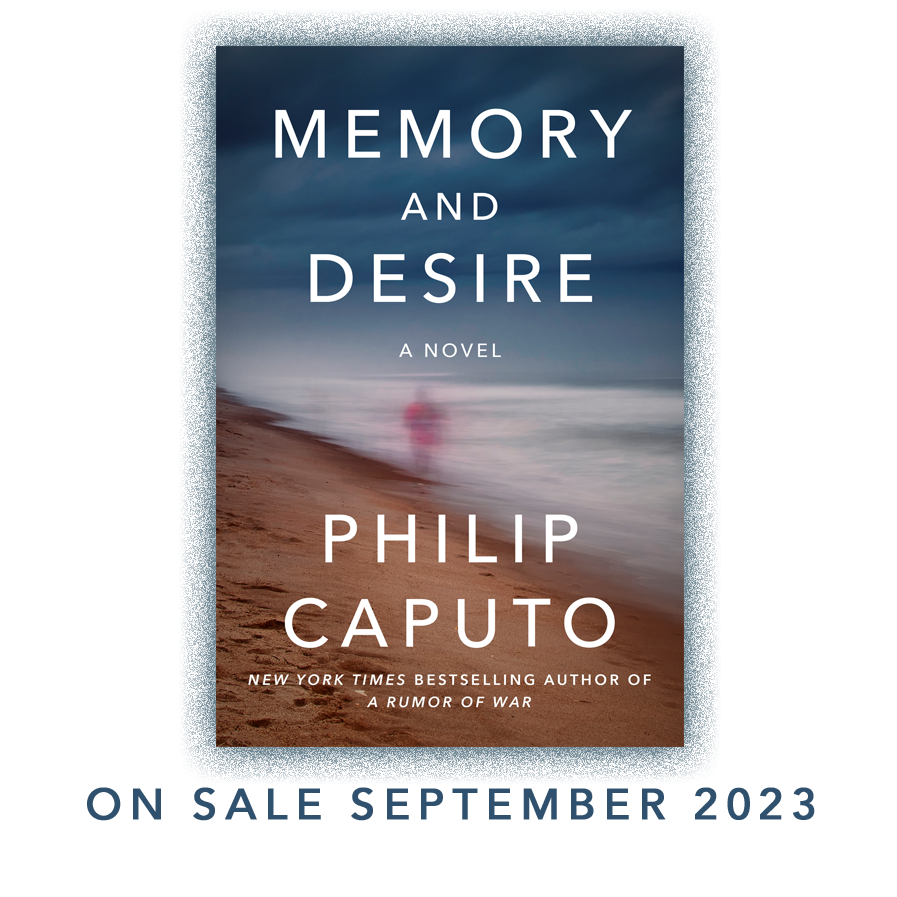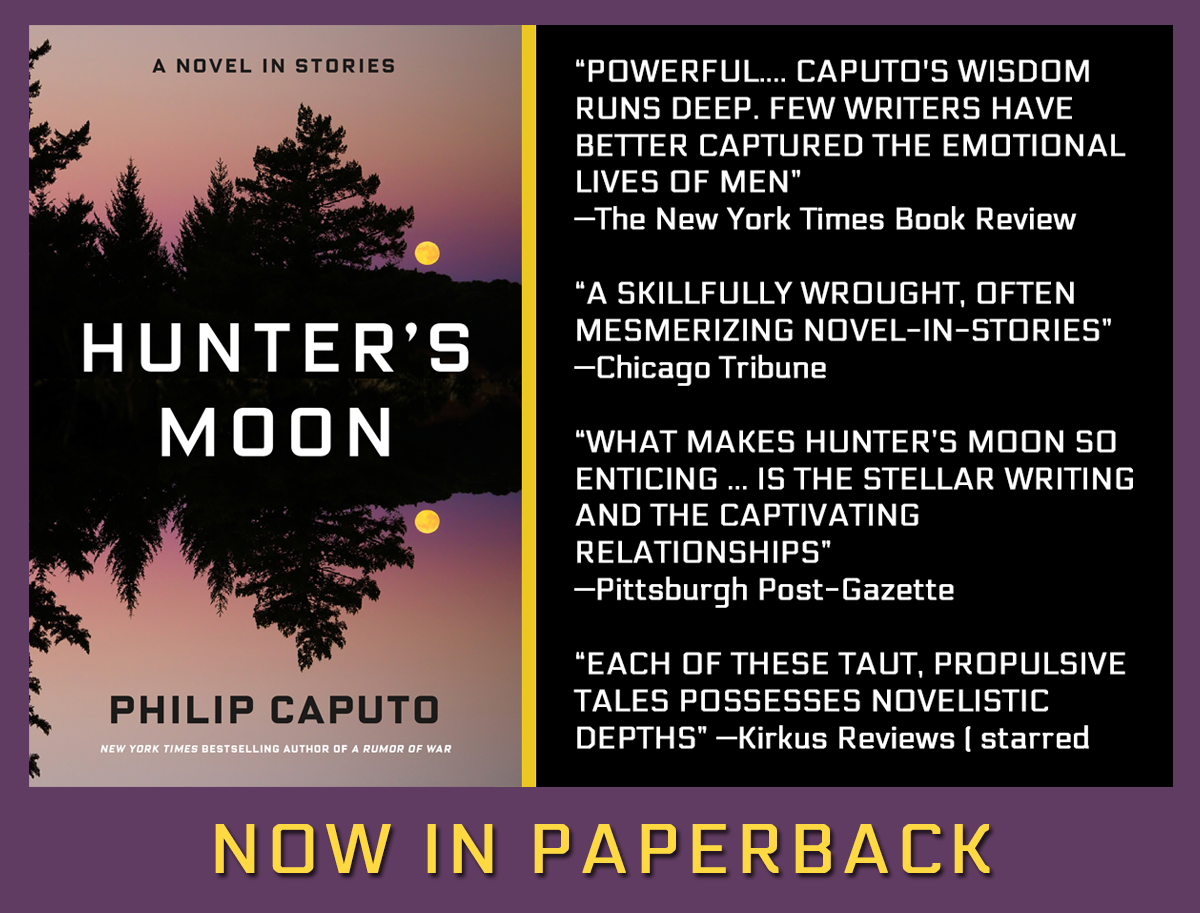My latest book, a collection of short stories titled Hunter’s Moon, will be released in two weeks (August 6 is the publication date) by Henry Holt & Co. It was inspired by two much older works of short fiction, one by a Russian writer, Ivan Turgenev’s A Sportsman’s Sketches, and the other by an American, Sherwood Anderson’s Winesburg, Ohio.
In the former, Turgenev, an avid outdoorsman, used hunting excursions to provide background for portraits of rural Russia and its people in the mid-19th-century. Anderson’s book, published in 1919 and still in print, is a series of loosely-connected tales that depicts life in a small midwestern town early in the 20th century. Winesburg, Ohio is considered a seminal work of modernist fiction, and it deeply influenced Ernest Hemingway’s 1925 story collection In Our Time, sometimes referred to as “the Nick Adams stories” for its recurrent character, Nick Adams, Hemingway’s alter-ego.
Hunter’s Moon mostly takes place in a fictional American town, Vieux Desert, on Michigan’s wild and remote Upper Peninsula. It features recurrent characters at different points in their lives over the course of several years, roughly from 2004 to 2018. One of them, Will Treadwell, who owns a microbrewery and pub in town, figures in five of the seven stories, sometimes in a minor role, sometimes as the protagonist. People who’ve read my 1987 novel, Indian Country, will recognize Treadwell and Vieux Desert. For years, I’ve wanted to return to it and to him, and Hunter’s Moon bought my ticket.
In a sense, Hunter’s Moon can be considered a novel in stories, much like Winesburg, Ohio. Like Turgenev’s A Sportsman’s Sketches (one of my favorite books, by the way), it is not about hunting per se; it employs hunting trips as a context to illuminate masculine relationships in today’s America: old high-school friends, war buddies, fathers and sons. One story, however, is told from a woman’s point of view, and presents a once-a-year, extra-marital affair as she experiences it.
Though I did not, at the outset, intend to write a book showing that white, heterosexual males — much maligned these days as racists, sexists, misogynists, etc. — are as complex, emotionally nuanced, and individualized as anyone else, but I realized that’s what I’d done when I finished it.
This book, my 17th and my 10th work of fiction, is my first venture into the short-story form. My only other try at shorter fiction was the 1998 collection of novellas, Exiles, which is, incidentally, a book I’m rather proud of. Writing it wasn’t easy, but I found that writing Hunter’s Moon was even harder. In short stories, there’s no room for side trips or leisurely longueurs.
I turned 78 this year, so I’m not sure how many more books are left in me, if any. But I hope those of you who read this will also read Hunter’s Moon — and feel that the trip was worth it.




You captured Mike’s character (Will) and others quite well. Thanks for this book…it was an emotional trip down memory lane! My ex and I owned a camp there and were good friends with some of the characters, and my ex hunted and fishedwith Jim Harrison, although I don’t think he ever got the opportunity to meet you. I wish I had met you in GM! I can’t wait to read Indian Country!
Just Discovered the author with Hunters Moon. Blown away I will now go to the other novels with relish.
Phil:
Thank you for your response. Finished Hunter’s Moon some weeks ago, and am almost finished with Indian Country.
What is your connection to the UP?
Jon
I’ve been going there, off and on, since 1962.
Phil: Does Vieux Desert equate to any actual UP town? I’ve enjoyed both Indian Country and Hunter’s Moon; both made especially relevant for me as a Vietnam Vet. We bought the books in Snowbound Books in Marquette, last month. Thank you.
Jon
Vieux Desert is loosely modeled on Grand Marais. Thank you for buying the book.
Recognized the Dunes Saloon and Andy’s bar. You capture the feel of the area and have great gifts of good story telling. Did you know Jim Harrison and now Ellen Airgood?
One of the best books I have read this year. Finished the ARC, and found it reminded my some of Hemingway and Harrison short stories, yet, pure Caputo. Thanks for filling some great evenings reading this gem.
Will read.
I haven’t read Hunter’s Moon yet, but will. I have read A Rumor of War and Indian Country. In the mid 1990’s, I interviewed my neighbor who was one of those marines arriving with you being met on the beach with flower leis. He never talked about his time in Vietnam until that interview according to his wife. He told me about his friend dying in his arms but I couldn’t find the friends name on the wall when the traveling Vietnam Memorial came to Marquette, Michigan. I ran into my neighbor (he no longer lived next door) in the grocery store and I told him I could not find his friend ‘s name on the Wall. How can I find this friend? Please contact me.
You should contact the National Park Service office at the Vietnam Memorial Wall in Washington, D.C. and ask for their directory of the servicemen and women listed on the wall. Your friend’s friend’s name should be on it.
Can’t wait